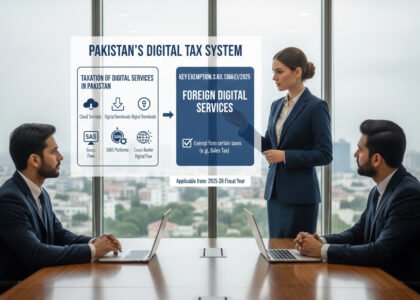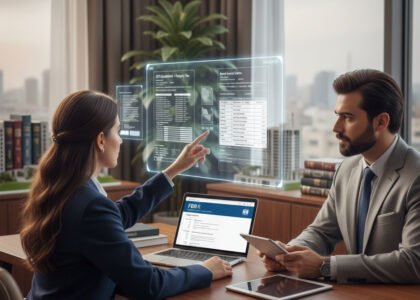The Federal Government has introduced Section 6A into the Income Tax Ordinance, 2001, through the Finance Bill 2025 to tax revenue generated from digitally ordered goods and services via locally operated e-commerce platforms. This provision reflects Pakistan’s shift toward regulating and taxing the fast-growing digital economy.
Let’s explore what this new section entails, its implications for e-commerce businesses, and how compliance should be approached.
Text of Section 6A – In Summary
Section 6A imposes a tax on persons receiving payment for goods or services ordered digitally and delivered within Pakistan using local online platforms or websites.
✅ Scope of Tax
Applies to gross receipts from digitally ordered goods or services.
Tax is calculated at the rate specified in Division IVA, Part I of the First Schedule (exact rate not specified here but typically ranges from 1% to 2%).
Only applies where delivery is within Pakistan.
❌ Exemption
Export proceeds that are already subject to withholding under Section 154 or 154A are excluded from this tax.
🔍 Understanding Key Elements of Section 6A
| Element | Explanation |
|---|---|
| Taxpayer | Any person (individual, business, company) receiving payment via a local e-commerce platform |
| Nature of Goods/Services | Must be ordered digitally (e.g., online order via app or website) |
| Delivery Location | Goods/services delivered within Pakistan |
| Platform Type | Local online marketplaces and websites (e.g., Daraz, Foodpanda, local SaaS portals) |
| Exclusion | Export proceeds taxed under Sections 154 or 154A are not taxed again under Section 6A |
————–
💡 Examples of Transactions Covered
| Scenario | Covered Under Section 6A? |
|---|---|
| A vendor sells clothes via Daraz to a Karachi customer | ✅ Yes |
| A restaurant uses Foodpanda for local delivery | ✅ Yes |
| A freelancer delivers digital services to a UK client | ❌ No (likely under Section 154A instead) |
| A tech company sells software through a local website | ✅ Yes |
| A business exports through Amazon with proceeds taxed under 154A | ❌ Exempt under proviso |
📌 Compliance & Impact for E-Commerce Sellers
Sellers must declare gross receipts from digital transactions.
Tax authorities may trace payments through payment gateways or platforms.
Tax deducted at source (if applicable) by platform operators can help ensure compliance.
Failure to report income under Section 6A may lead to penalties or audits.
📈 Policy Rationale
The introduction of Section 6A addresses:
Tax leakage in digital sales
Inclusion of informal online sellers in the tax net
Growth of platforms like Daraz, OLX, and localized marketplaces
Ensuring domestic transactions are distinguished from exports (to avoid double taxation)
✅ 20 Frequently Asked Questions (FAQs)
Q1: What is Section 6A of the Income Tax Ordinance, 2001?
A: It imposes a tax on digital payments received through local e-commerce platforms for goods/services delivered within Pakistan.
Q2: Who is liable under Section 6A?
A: Any person (seller, service provider, freelancer) who receives payment via a local online platform for deliveries in Pakistan.
Q3: Does this apply to international platforms like Amazon?
A: Only if the platform is locally operated and the goods/services are delivered within Pakistan.
Q4: Are export services covered?
A: No, export proceeds already taxed under Section 154 or 154A are exempt.
Q5: What is the tax rate under Section 6A?
A: The applicable rate is specified in Division IVA, Part I of the First Schedule (commonly 1-2%).
Q6: What are gross receipts?
A: The total amount received before deducting any expenses or costs.
Q7: Will this apply to freelancers selling services within Pakistan?
A: Yes, if the service is ordered and delivered digitally through local platforms.
Q8: Is there a threshold limit?
A: The section does not specify a threshold, so all receipts are potentially taxable unless exempted elsewhere.
Q9: Who will deduct the tax—platform or seller?
A: If the platform is an agent or intermediary, it may be required to withhold tax at source.
Q10: Are payments through WhatsApp or Instagram covered?
A: Only if the transaction is processed through a platform or website with digital ordering features.
Q11: Is COD (Cash on Delivery) included?
A: Yes, if the order is placed digitally.
Q12: Does this apply to rental services offered online?
A: Yes, if the service is booked through a digital platform and delivered locally.
Q13: How should sellers report this income?
A: As part of business income in their tax return, classified under digital/e-commerce transactions.
Q14: Does FBR monitor such transactions?
A: Yes, especially with integration of POS systems and digital payment gateways.
Q15: Are educational course sales affected?
A: Yes, if sold via local websites and delivered online in Pakistan.
Q16: Are ride-hailing services like Careem included?
A: Potentially yes, if their model fits the definition of local e-commerce delivery.
Q17: Are restaurants using delivery apps affected?
A: Yes, since they receive digital orders and deliver locally.
Q18: Is income earned from Fiverr included?
A: No, such income usually qualifies as export and falls under Section 154A.
Q19: Can tax paid under Section 6A be adjusted?
A: Yes, it may be adjusted against final tax liability unless it falls under minimum tax regime.
Q20: Should sellers revise their invoices to reflect this tax?
A: Yes, it is advisable to include the tax treatment in invoices and records for transparency.
Section 6A marks a significant development in Pakistan’s tax policy toward e-commerce and digital transactions. It clearly targets local platform-based sales and service providers to broaden the tax base, improve transparency, and align with global digital tax trends.
Businesses engaged in online sales must review their accounting practices, ensure correct classification of income, and comply with Section 6A reporting requirements to avoid future liabilities.






